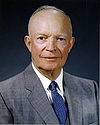“Every gun that is made, every warship launched, every rocket fired signifies, in the final sense, a theft from those who hunger and are not fed, those who are cold and are not clothed. This world in arms is not spending money alone. It is spending the sweat of its laborers, the genius of its scientists, the hopes of its children. . . . This is not a way of life at all, in any true sense. Under the cloud of threatening war, it is humanity hanging from a cross of iron.”

Was it politics-as-usual, war-by-other-means, or were his words the earnest thought of a man who really knew the price of war?
Dwight David Eisenhower (1890-1969) was the Supreme Allied Commander by the end of World War II, first military head of N.A.T.O., and then a landslide Republican winner of the 1952 U.S. Presidential election. He served two terms as President, during which the Cold War deepened and America prospered mightily. This quotation comes from his widely broadcast and historically notable 1953 “Chance for Peace” address, sometimes known as the “Cross of Iron” speech. Even Wikipedia notes the “debatable” sincerity of his words, and yet they are urgent and fine and no less true today.
He elaborated the purely economic price of the arms race like this: “The cost of one modern heavy bomber is this: a modern brick school in more than 30 cities. It is two electric power plants, each serving a town of 60,000 population. It is two fine, fully equipped hospitals. It is some fifty miles of concrete pavement [worth noting that the American Interstate highway system was developed during his administration, though he didn’t later lament the power of the “automotive-industrial-suburbanization complex”; that was left for Jane Jacobs and others]. We pay for a single fighter with a half-million bushels of wheat. We pay for a single destroyer with new homes that could have housed more than 8,000 people.”
The speech, given early in his first term and just after Stalin’s death, contrasts dramatically with the peacetime rise in American military spending during his Presidency, and to his famous — and famously ignored, still ignored, astonishingly and helplessly ignored — warnings, in his final Presidential address, about the growth of a “military-industrial complex” in the United States. Watch Barack Obama try to advance his country’s health care system (or gun laws, or education priorities) now, or sneak a backward glance at Dwight Eisenhower¹, and it’s fair to ask, How much power does an American President actually have?
¹ Interestingly, for a leader of the suppression of the Nazis, a German name, meaning “hewer/miner of iron”.
